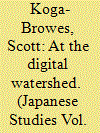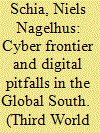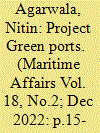|
|
|
Sort Order |
|
|
|
Items / Page
|
|
|
|
|
|
|
| Srl | Item |
| 1 |
ID:
117505


|
|
|
|
|
| Publication |
2012.
|
| Summary/Abstract |
The switch to digital terrestrial broadcasting on 24 July 2011 marked a watershed for the broadcasting industry in Japan. Digitalisation is the single largest industry-wide event since the advent of alternative distribution technologies, satellite and cable, in the 1980s. Preparation for the switch to digital, known as chideji-ka, has put existing business arrangements under pressure and has led to a renewed focus on the future shape of the industry. There is increasing acknowledgement that change, especially in the relationship between central and local broadcasters, is inevitable. This paper summarises the position of the industry at the beginning of its digital age, arguing for a new view of broadcasting in Japan that recognises the two-tier reality behind industry rhetoric. It also summarises the major options open to the industry as it looks to redefine itself in a much-changed media environment.
|
|
|
|
|
|
|
|
|
|
|
|
|
|
|
|
| 2 |
ID:
158641


|
|
|
|
|
| Summary/Abstract |
How does digitalisation lead to new kinds of global connections and disconnections in the Global South? And what are the pitfalls that accompany this development? Much of the policy literature on digitalisation and development has focused on the importance of connecting developing countries to digital networks. Good connection to digital networks may have a fundamental impact on societies, changing not only how individuals and businesses navigate, operate and seek opportunities, but also as regards relations between government and the citizenry. However, the rapid pace of this development implies that digital technologies are being put to use before good, functional regulatory mechanisms have been developed and installed. The resultant shortcomings – in state mechanisms, institutions, coordination mechanisms, private mechanisms, general awareness, public knowledge and skills – open the door to new kinds of vulnerabilities. Herein lie dangers, but also opportunities for donor/recipient country exchange. Instead of adding to the already substantial literature on the potential dividends, this article examines a less studied issue: the new societal vulnerabilities emerging from digitalisation in developing countries. While there is wide agreement about the need to bridge the gap between the connected and the disconnected, the pitfalls are many.
|
|
|
|
|
|
|
|
|
|
|
|
|
|
|
|
| 3 |
ID:
172205


|
|
|
|
|
| Summary/Abstract |
This article seeks to advance contextualised understanding of the extent to which a cashless economy in India can be a feasible developmental goal. Initially, impressed with critiques of the sudden ‘demonetisation’ on 8 November 2016, we conducted econometric research to test how banks (‘bricks’) could be brought closer to rural people. However, this traditional approach of envisaging more banks was rapidly overtaken by the massive uptake of digital payment methods (‘clicks’) in India since 2016. Partly driven by the Reserve Bank of India (RBI), this has raised new concerns and research agenda focused on people’s trust in banking and new technologies, consumer skills and people’s basic rights vis-à-vis a state that, controversially, now seems to be seeking more control within a relentlessly changing postmodern scenario.
|
|
|
|
|
|
|
|
|
|
|
|
|
|
|
|
| 4 |
ID:
156529


|
|
|
|
|
| Summary/Abstract |
In the wider context of growing digitalisation in South Asia, this article examines the impacts of a public–private–people partnership (4Ps) information and communication technology (ICT) initiative of the Bangladesh government, administered through local governmental offices, the Union Information Service Centre (UISC). Scrutinising the operation of six UISCs in rural communities across Bangladesh, the study researches the potential of ICTs to influence existing asymmetrical power relations and empower local people. Asking to what extent ICTs enable more people to actively participate in their communities and what the implications for empowerment are, it is found that top-down ICT intervention by itself cannot bring substantial change for people at the bottom of the social pyramid. Asymmetrical power relations continue to deprive marginalised groups from receiving the claimed benefits of ICT facilities. The study suggests the need for a more critical, practice-focused understanding of relationships between ICTs and rural empowerment, while also highlighting the changing modalities of connecting states and their citizens in postmodern South Asia.
|
|
|
|
|
|
|
|
|
|
|
|
|
|
|
|
| 5 |
ID:
170933


|
|
|
|
|
| Summary/Abstract |
This article analyses changes in diplomatic practices brought by twenty-first century communications technologies. There exists a close relationship between communications technologies and diplomatic practices. Since the invention of the telegraph at the end of the nineteenth century, diplomacy has been conducted at a progressively faster pace. The most recent technological developments associated with Internet have increased the speed and reach of communications, with consequences in international politics that International Relations scholars have yet to understand. Building on existing scholarship in diplomatic studies, the analysis adopts a historical perspective on the use of technology in diplomacy, examines the impact of digitalisation on diplomatic practices, and suggests new research questions that scholars need to answer. All this shows that International Relations scholars would be well-served by looking at the transformative impact of new communications technologies.
|
|
|
|
|
|
|
|
|
|
|
|
|
|
|
|
| 6 |
ID:
175910


|
|
|
|
|
| Summary/Abstract |
Amid rapid changes to energy systems around the world, there has been ongoing debate regarding incumbent actors' ability to respond to disruptive forces. This paper investigates the corporate strategies of the UK's large vertically integrated energy companies (the ‘Big Six’) between 2008 and 2016. Four of these companies are part of international groups, with parent companies in Germany, France and Spain. By analysing data from publicly available documents and a small number of key informant interviews with current and former decision-makers within Big Six companies and other stakeholders, this paper assesses their responses to three potentially disruptive changes to the UK's electricity sector: decarbonisation, decentralisation and digitalisation. Each of the Big Six have taken significant steps towards decarbonisation, with some progressing faster than others. Most have remained committed to centralised generation investments, and a couple have made early moves towards digital retail products and services but with limited impact thus far. The authors conclude that the UK's incumbent electricity firms have shown that they are able to adapt given strong policy incentives. Policy-makers should continue to set ambitious targets for the electricity sector, while taking into account the role of international parent companies in driving a broader strategy.
|
|
|
|
|
|
|
|
|
|
|
|
|
|
|
|
| 7 |
ID:
190734


|
|
|
|
|
| Summary/Abstract |
Seaports have evolved with changing technologies to ensure the handling of close to 80 per cent of global trade by volume and 70 per cent by value. As the ports have grown across the world, unabated pollution from numerous activities of ships, ports, industries, and infrastructure development has forced countries to focus on safe, efficient, and sustainable ports by focusing on community development to achieve cleaner harbours, skies, and soil. An effort of the Government of India for major Indian ports in this direction is Project Green Ports. Though the project was initiated in 2016, there is little update available about the project. It is to fill this gap that the article discusses the progress of the major Indian ports towards becoming green ports. In doing so, the article analyses the efforts made and the existing shortcomings to answer whether the Indian ports are on the right track to becoming green ports.
|
|
|
|
|
|
|
|
|
|
|
|
|
|
|
|
| 8 |
ID:
192007


|
|
|
|
|
| Summary/Abstract |
Can trust – a core element of diplomacy – be taken online and if so, how? This article starts form the concern that trust is tied to face-to-face diplomacy, which is challenged in digitalising settings. We adopt a practice theoretical lens and study diplomatic information sharing in the Council of the European Union. Drawing on fieldwork from 2018–2021, we find that digital tools are indispensable for trust's enactment and, contrary to commonly held assumptions, do not negatively impede diplomatic trust, per se. Theorising from how diplomats handle digital tools, we find that this leads to a renegotiation of the place and boundaries of trust in diplomatic work. First, we show how digital tools create both new opportunities for and challenges to diplomatic trust, though these opportunities are more accessible to some than others. Second, whereas trust is taken online, it is not easily built digitally. Third, digital tools lead to a rearticulation of the place of transparency and confidentiality in diplomatic negotiations. It pushes diplomats to reconsider what it means to share information in an (un)trustworthy manner. Altogether, these findings further our understanding of contemporary diplomatic practice and offer a refined conception of diplomatic trust.
|
|
|
|
|
|
|
|
|
|
|
|
|
|
|
|
|
|
|
|
|